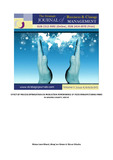EFFECT OF PROCESS OPTIMIZATION ON PRODUCTION PERFORMANCE OF FOOD MANUFACTURING FIRMS IN NAKURU COUNTY, KENYA

View/
Date
2024-10Author
Mueni, Mutua Janet
Omare, Mong'are
Gitachu, Gibson
Metadata
Show full item recordAbstract
Food manufacturing firms in Kenya are currently contending with inefficient processes that have caused a rise in production costs. The current study assessed the effect of process optimization within business process re-engineering on the production performance of food manufacturing firms in Nakuru County, Kenya. The study was anchored on absorptive capacity theory. A correlational research design was adopted. The study's target population was the 13 food manufacturing firms in Nakuru County. Data was collected by questionnaire and analyzed through descriptive and inferential statistical methods. Statistical Packages for Social Sciences (SPSS) aided data analysis. According to the descriptive findings, the manufacturing firms’ production performance was affected by the process optimization. As per the correlation analysis results, the correlation coefficient was (r=0.528**; p=0.000). This implies a significant relationship, hence process optimization affects production performance. The regression analysis findings revealed R-squared value of 0.279, indicating that 27.9% of the variability in production performance was explained by process optimization. In conclusion, the process optimization streamlines manufacturing activities and enhances operational efficiency. The study recommends that food manufacturing firms integrate process optimization into their overarching operational strategy. The study provides valuable insights into enhancing manufacturing processes for improved production efficiency. It contributes to academic understanding and offers practical solutions for optimizing performance in the manufacturing industry.
